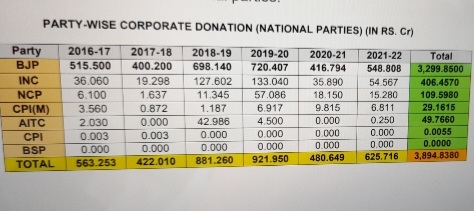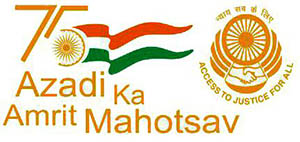New Delhi: Supreme Court of India has issued a directive today, mandating the SBI to furnish electoral bond details before the court by the end of tomorrow's business hours on March 12.
This decision comes as a major setback for the SBI amplifying the ongoing scrutiny surrounding electoral bond transparency as the Apex court rejected its plea for extension till June.
The apex court reprimanded the SBI for failing to disclose electoral bond donor details to the Election Commission of India (ECI) by March 6, as previously ordered.
The SBI had sought an extension until June 30th, which was denied by the Supreme Court.
In response to the SBI's plea, the court emphasized the urgency of the matter and instructed the bank to publish all information pertaining to electoral bond donors on its website by March 15.
Furthermore, the court questioned the SBI on why contempt proceedings should not be initiated against it for non-compliance with its orders.
The bench presiding over the case consists of justices Sanjeev Khanna, BR Gawai, JB Pardiwala, and Manoj Mishra, who have been closely monitoring the electoral bond scheme's implementation.
Electoral bonds have been under intense scrutiny since their inception in 2019.
The Supreme Court's rejection of the scheme follows challenges mounted by various entities, including the Association of Democratic Reforms and civil society groups, alleging lack of transparency.
Specifically, concerns have been raised regarding political parties' failure to disclose electoral bond details to the ECI.
Background:
Earlier, in a landmark judgment, the Supreme Court of India had declared the Electoral Bond Scheme as well as certain provisions of the Representation of the People Act 1951 and the Companies Act as unconstitutional.
The scheme, which allowed for anonymous donations to political parties, was deemed violative of Article 19(1)(a) of the Constitution, which guarantees the right to freedom of speech and expression.
Supreme Court of India, headed by Chief Justice of India (CJI), Justice Dhananjaya Y Chandrachud, justices B R Gavai, J B Pardiwala, and Manoj Misra, delivered a historic judgment regarding electoral bonds.
Apex Court deemed the deletion of the proviso to Section 182(1) of the Companies Act, which permitted unlimited corporate contributions to political parties as arbitrary and violative of Article 14, which ensures equality before the law.
Political parties are required to submit detailed particulars of donors, the amount of each bond, and the particulars of the bank account to which the amount has been credited.
The Supreme Court highlighted that its interim order from April 12, 2019, required disclosure of all contributions made through Electoral Bonds, not just those in a specific year, as clarified by the Election Commission of India (ECI).
In light of the judgment, the Supreme Court issued several directives:
- The issuing bank must cease the issuance of Electoral Bonds.
- The State Bank of India (SBI), the designated issuing bank, must submit details of all Electoral Bonds purchased since the interim order of April 12, 2019, including the purchaser's name and the bond denomination.
- SBI must also disclose details of all political parties that have received contributions through Electoral Bonds since April 12, 2019, including the date of encashment of each bond.
- This information must be provided to the ECI within three weeks from the date of the judgment.
- The ECI is mandated to publish the information on its official website within one week of receipt.
- Electoral Bonds within the validity period but not yet encashed by political parties must be returned to the issuing bank for a refund to the purchaser's account.
The Supreme Court concluded by disposing of all writ petitions in line with the judgment and also cleared any pending applications related to the matter.
This decision marks a significant step towards enhancing transparency and accountability in political funding, ensuring that the democratic process is more equitable and accessible to all citizens.
The bench's judgment reflects a commitment to upholding democratic values and ensuring the integrity of the electoral system. It underscores the judiciary's role in safeguarding the principles of fairness and transparency in the democratic process.
This landmark ruling is likely to have a significant impact on future electoral reforms and the regulation of political funding in India. It marks a crucial step towards strengthening democratic institutions and promoting public trust in the electoral process.




